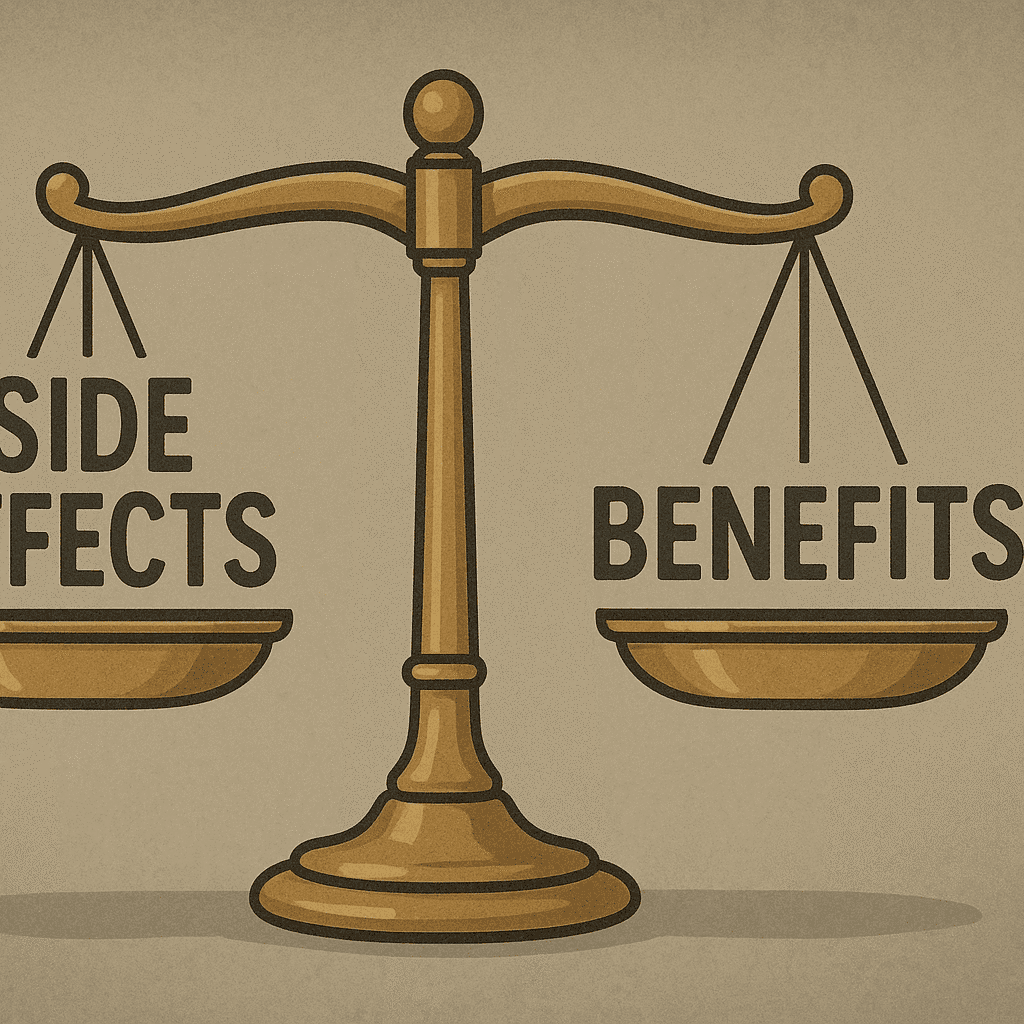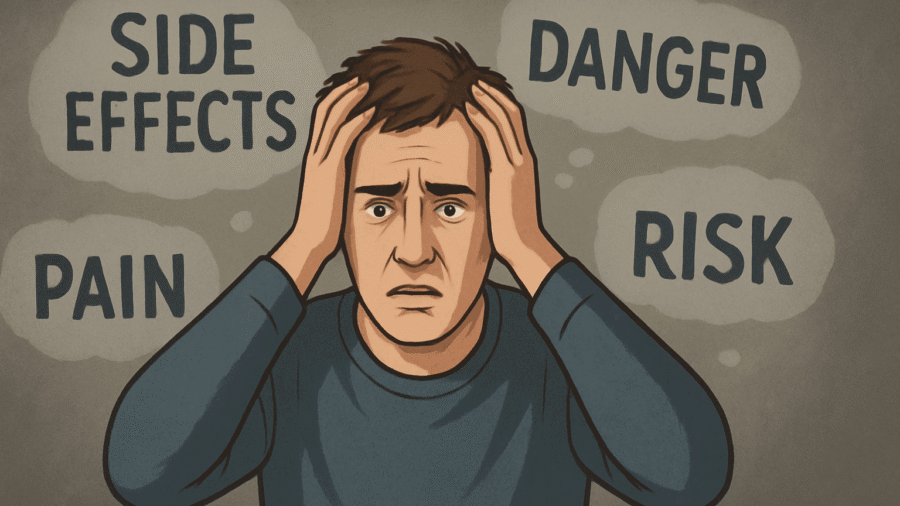You have probably already heard or read about the placebo effect, the idea that believing you are getting a treatment will cure you even if the treatment itself does not exist. But what if something like the opposite were possible as well?
What If a Thought Could Make You Sick?
This is the nocebo effect. It is when a harmless pill or negative words brings real pain, anxiety or illness not because of what it is, but because of what your mind believes.
You belief that, “The treatment will make you feel worse.” And soon, your body is in pain.
You dread a procedure and your blood pressure rises even before it even happens.
As much as it sounds like something out of science fiction, doctors, scientists and patients are seeing it happen every day. From side effects that manifest simply because someone expects them, to illness caused by fear.
The nocebo effect shows us just how much the mind can be harmful and powerful when it is made to expect the worst.
What Is the Nocebo Effect?
The word nocebo is a Latin word meaning “I will harm. Its opposite Placebo, also means “I shall please.” The nocebo effect is when negative expectations alone cause real, harmful symptoms even when there is no physical reason.
Think of someone taking a harmless sugar pill, but being told it may induce headache. If the headache appears, that is nocebo in motion.
Negative expectations can thus go a long way to interfere with treatment effectiveness, disrupting trust and healing in clinical interventions (Nasiri-Dehsorkhi, et al., 2024).
Why Fear Can Be More Powerful Than Hope
Our minds are wired to notice danger before anything else. It is how we have managed to remain alive for thousands of years. That is why fear can sometimes have a stronger effect on our bodies than hope.
A study comparing placebo and nocebo effects have shown that nocebo effects (negative expectations) are stronger and last longer than placebo effects (positive expectations) (Kunkel,et al., 2025).This means that when we expect something bad to happen like pain, sickness or side effects, it might actually happen, even if the treatment itself is harmless.
Researchers have again made it clear that nocebo responses are neurobiological occurrences brought about by negative expectations (Colloca & Miller, 2011). In hospitals and clinics, Caliskan et. al., (2024) found that just hearing about possible side effects can increase pain or make people feel worse.
When Words Hurt: How Language Can Weaponise Healing
What we hear and think about matters more than ever.
Sometimes, even hearing about possible side effects will give you the side effect, even if the drug itself is not harmful.
For example, a doctor might say, “This may cause pain or nausea,” and suddenly, you feel pain or nausea. That is because your brain takes the warning seriously and prepares your body for it.
An article by Blease et al., (2024) from TIME reported that anxious or concerned patients are more likely to have side effects after having learnt about them.
Another report by May (2024) in The Guardian just observing the pain of another person is sufficient to increase your own pain.
So, there still remains the question, Is pain only in the mind?
The Nocebo Effect in Everyday Life
You do not necessarily need to be in a hospital to feel the nocebo effect. It can also come up in our daily lives:
- Feeling sick after reading the side effects of something on a website.
- Experiencing pain after hearing someone else’s pain story.
- Building tension throughout the day because you “just know” something will go wrong.
These are not imaginary. They are the body responding to what your mind anticipated.
How to Protect Yourself from the Nocebo Effect

Sometimes, what you believe can make you feel worse. But you can train your mind to focus on healing.
Here are some techniques for calming the mind’s danger signals and creating a safer, more nurturing inner world:
- Watch out for negative expectations
If you find yourself thinking, “This will hurt,” stop and ask yourself, “Do I know that for sure?”, Is that truth or just a suggestion? - Ask for the full picture
Look both risks and benefits when you read or learn about treatments. Don’t just focus on side effects. Also ask, “What are the good things this can do?“ - Don’t frighten yourself with bad news
Some health blogs, post or videos are only meant to scare you. Try not to watch or read too many of them. - Shift focus to what supports healing
Picture yourself feeling calm, safe and getting better. - Be around kind people
Surround yourself with people, doctors, nurses, and loved ones who make you feel safe. They can actually help you in your recovery.
When the Mind Harbors Fear, the Body Listens
The nocebo effect shows that beliefs can shape symptoms as much as bacteria or bruises. Our thoughts do not exist in a bubble; they resonate within our biology.
This means recognising that the mind can be both medicine and mischief. So, when worry becomes too loud, the body answers.
And if your mind is powerful enough to cause discomfort, then it is also powerful enough to support healing.
REFERENCES
Bedjabeng, C. A. (2025). Understanding the placebo effect and its role in healing. PsycheShare. https://psycheshare.com/understanding-the-placebo-effect-and-its-role-in-healing/
Blease, C., Bernstein, M., Locher, C., & Brown, W. (20224, April 4). Your doctor’s words could make you sick. TIME. https://time.com/6963052/nocebo-effect-essay/
Caliskan, E. B., Bingel, U., & Kunkel, A. (2024). Translating knowledge on placebo and nocebo effects into clinical practice. Pain reports, 9(2), e1142.
Colloca, L., & Miller, F. G. (2011). The nocebo effect and its relevance for clinical practice. Psychosomatic medicine, 73(7), 598-603.
Kunkel, A., Schmidt, K., Hartmann, H., Strietzel, T., Sperzel, J. L., Wiech, K., & Bingel, U. (2025). Nocebo effects are stronger and more persistent than placebo effects in healthy individuals. eLife, 14.
May, N. (2024, April 29). You’ve heard of the placebo effect — but what’s the nocebo effect? Is pain all in the mind? The Guardian. https://www.theguardian.com/australia-news/2024/apr/30/placebo-effect-nocebo-effect
Nasiri-Dehsorkhi, H., Vaziri, S., Esmaillzadeh, A., & Adibi, P. (2024). Negative expectations (nocebo phenomenon) in clinical interventions: A scoping review. Journal of Education and Health Promotion, 13(1), 106.



Add a Comment